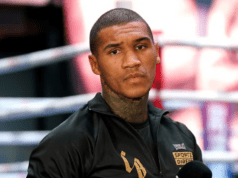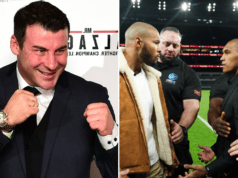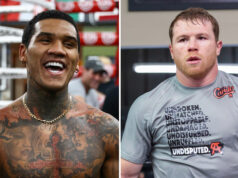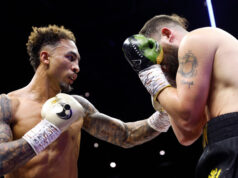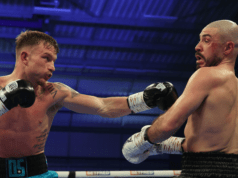Andre ‘The Matrix’ Dirrell recently announced to the press that he is on the comeback trail after recovering from the neurological issues that placed his career on hold following Arthur Abraham’s illegal blow in March of last year. That injury ended his involvement in the Super Six and with it the seemingly inconvenient showdown with good friend Andre Ward in the next round. Throughout the tournament Dirrell, whether intentionally or not, courted controversy to such an extent that his prodigious boxing ability was overshadowed by criticism and adverse headlines.
Question marks were also raised concerning his mental fortitude and appetite for the big stage. But today is a new day and Dirrell is training in Florida for a tune up bout in April before setting his sights on IBF Champion Lucian Bute and – yes, you heard right – WBA holder Andre Ward. Dirrell’s reputation has been tarnished in the eyes of many boxing fans, so it will be interesting to see whether his comeback can lead to a Road to Damascus transformation, or if he will continue to make headlines for largely the wrong reasons.
Despite earning a bronze medal in the 2004 Summer Olympics, Dirrell hadn’t accomplished much in his early career, and it was a big honor to be placed alongside such illustrious names as Mikkel Kessler, Carl Froch, Jermain Taylor, Arthur Abraham and even fellow novice Andre Ward (who had claimed gold in the same Olympics) in the Super Six Tournament. Dirrell’s first bout against WBC champion Froch in Nottingham, England, proved to be a microcosm of everything that can make him an infuriating fighter. Technically he was superior to the champion, evading him for the most part and landing the cleaner shots. even wobbling Froch at one point. But on the other hand he stank the joint out by continually running, clinching, bending-over, turning his back and complaining to the referee. It seemed like only one man had turned up to fight and it wasn’t Andre Dirrell.
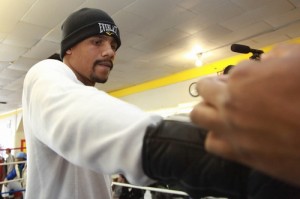
His tactics were to cost him and he ended up on the wrong side of a split decision. Whether Dirrell should have lost the fight is a contentious issue and one that has been debated to death but, for me, the more compelling talking point was his inability to seize the initiative and claim a fight that was there for the taking. Some mental stumbling block, whether it was a fear of Froch’s power or a fear of failure, the partisan crowd or the big stage, prevented him from using his superior boxing ability to secure an incontestable points victory.
After postponing his next bout against Abraham due to a back injury he picked up in training, the location was changed from Rancho Mirage, California to Detroit, in his home state of Michigan. The fight itself was not the stinker many had feared after the Froch fight. Dirrell was gamer, holding the middle of the ring while utilizing his dazzling hand-speed and movement to build a commanding lead. The Matrix was looking the real deal at last, but as the fight unfolded into the finals rounds, Abraham shrugged off his typical slow start and went head-hunting. Dirrell reverted to his Froch tactics – running and spoiling – but at least this time there was logic behind the decision as he only had to see out the last few rounds to claim a comfortable decision on the cards.
A minute into the 11th, he was full on sprinting from Abraham when some water in his corner and a glancing blow caused him to slip to the seat of his pants. Abraham impudently followed up with an uppercut to the chin while Dirrell was still down. There was a tangible pause before he fell to his back and began twitching.
For some cynical boxing fans – the type who said Kermit Cintron took a dive through the ropes against Paul Williams – Dirrell faked the knockout. They pointed to the fact that Abraham was ratcheting up the pressure and increasingly landing big shots. They shouted loud across internet forums that Dirrell’s performance was worthy of an Oscar. They left us in no doubt that his winning the fight after being deemed unfit to continue sure beat having that Armenian powerhouse looking to take his head off his shoulders for another five minutes.
The rest of us accepted what we had witnessed at face value… Dirrell was hit with a blow he hadn’t expected and was totally unprepared for. Consequently he was knocked out and Abraham was deservedly disqualified – but whichever viewpoint you subscribed to, there was no denying it was controversial and unfortunately this controversy was soon followed by another.
The build up to Dirrell’s next fight against good friend Andre Ward was notable due to the media blackout surrounding it. At the eleventh hour the date was postponed without a venue being named, tickets being sold, or any form of promotion having been undertaken. When it broke that Showtime had sent legal letters to both parties threatening to sue if their contractual obligations were not met, journalists and fans alike began to question whether the two fighters had any intention of facing each other at all.
Then came the news we had all been expecting but did not want to hear – the fight with Ward was off but, not only that, Dirrell was pulling out of the entire tournament due to injury. A Showtime press release informed us he had been referred to a neurologist after suffering headaches, insomnia and dizziness and he was advised to take a lay-off. This was far too convenient for some to swallow, not least because Dirrell’s promoter, Gary Shaw, stated after the Abraham bout that his fighter had been given a clean bill of health following a brain scan and urine tests.
Dirrell’s withdrawal was controversial enough, but the lunacy that followed on episode 8 of Showtime’s Fight Camp 360 documentary amplified it to stratospheric proportions. Most boxing promos are little more than an exercise in PR masturbation but it was clear that Showtime had an axe to grind and the Dirrell camp – through sheer stupidity – were happy enough to put their heads on the chopping block.
An early scene filmed seven weeks before the original date for the fight saw Leon Lawson, Dirrell’s uncle and corner-man, give the following quote: “It’s not a guarantee that we fight Ward next, it’s not a guarantee. This is a business, you know? We prize fighters, not pride fighters. If they want to dance then get that money right.”
Worse was to follow was a scene filmed in the aftermath of the withdrawal. Dirrell was asked the name of his doctor by an off-screen interviewer. He gave the following response: “I can’t recall his name. We seen the family doctor… what’s the family doctor’s name? And he referred us to… Doctor? … What’s that guy’s name? Shawhi… Dr. Shawhi!”
A clearly uncomfortable Dirrell then turned to his grandfather and whispered a short, unheard sentence. Grandpa responded by turning to the camera and stating that he wanted to end the interview as he thought a lawyer should be present. Only, before the plug was pulled, Uncle Leon had time to make the following odious statement: “You don’t think I want to make money? I love making money. I ain’t making no money now, I ain’t doing nothing else. Sad to say but if it was someone else I would be trying to run them back up in there [to fight] but not him, he’s my family.” Note to fighters unrelated to Leon Lawson, please do not hire him if you think you may be suffering from an injury.
Dirrell and his family clearly did themselves no favors in the documentary but the bottom line is they cannot be tried and convicted by television. An athlete can never be accused of faking an injury unless the evidence is absolutely incontestable. To use a term borrowed from too many bad cop dramas, the evidence here is only circumstantial, so Dirrell has to be given the benefit of the doubt.
Lest we forget due to the controversies of the Super Six, Dirrell is actually an extraordinarily talented boxer. If his head is in the right place and he adopts a positive approach, he can trouble anybody at 168 pounds, so it will be great to once again see him facing off against the top names in the division. He was recently quoted in the Flint Journal as saying: “I’m on my way back, and after a warm-up fight then I really, really, really want to get in there with Lucian Bute to definitely take his title then I go after Andre Ward. Bute is definitely in my radar, I would love to fight him and I’m sure it will soon come.”
There are plenty of options out there for a Dirrell return, including a showdown with Ward. Like he mentioned in the interview, he could face Bute, who has recently signed with Showtime, or even a mouth-watering rematch with Froch or Abraham, once the Super Six has played out. Boxing fans can have short memories so a victory against any one of these guys would go a long way to erasing his chequered history.
Dirrell’s career is at a crossroads right now. He is like the colleague we have all known at work who explains away his many absences with a litany of exotic illnesses and unlikely personal crises and you think to yourself, “Is this the unluckiest guy in the world or we all being taken for a ride?” But we should bear in mind that he is still only a young man – and we have all made mistakes in our youth – so I will not be dwelling on the events of the Super Six any longer.
I hope boxing fans will give Dirrell another chance, as he really is a special fighter and has all the ingredients required to reach the pinnacle of the Super Middleweight division. Only this time around, can I just request that uncle Leon stays away from the cameras entirely, and the rest of the family undertake some form of media training?


